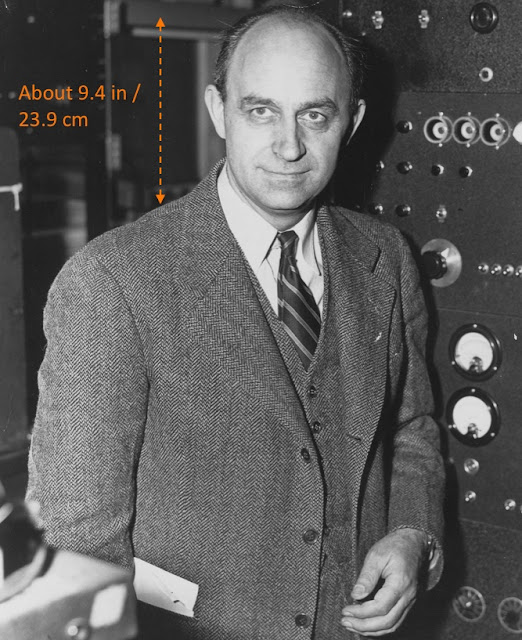 |
| How tall was Enrico Fermi, the physicist? How would you estimate? Assume he doesn’t have extraordinarily long legs. |
An important skill in a lot of skilled reading (or fact checking, or just being a skilled SearchResearcher) is being able to do quick estimates of values by just doing a bit of thinking about them.
This estimation technique is often called Fermi Estimation, after the famous physicist who was known for his ability to good approximate calculations with little or no actual data. These are sometimes called “back-of-the-envelope calculations,” but great Fermi Estimators don’t actually do this without any data–they need to start somewhere… but they know a few key facts, and then work forward from what they know towards an estimate. Fermi estimationg problems typically involve making reasonable guesses about quantities, their variances, the upper and lower bounds, and how to combine guesses together to lead to a useful insight.
This came up for me recently when the shopper in front of me at the grocery store insisted that she wanted 1.00 pounds of ground hamburger. When the butcher dropped a lump of ground beef onto the scale, she insisted on NOT paying for the 1.05 pounds, but she really wanted 1.0o pounds.
The butcher rolled his eyes and removed a tiny bit of meat to get it exactly to 1.00 pounds.
I immediately thought of this as a Fermi Estimation question: About how big a lump of meat is 0.05 pounds? Would it be the size of your hand? Would it be the size of your little finger?
If you assume that ground beef is about the same weight as water, then if we know how many ounces are in 0.05 pounds, then we can estimate the volume of meat that represents.
Here’s the Fermi Estimation I did in my head:
In the US, 1 pound is 16 ounces. In particular, 1 pound of meat (which weighs about the same as water) is 16 ounces. First I converted that number into a ratio I could work with. I realized that 0.05 of 1 pound is half of 0.1 of a pound… and that’s half of 1.6 ounces, or 0.8 ounces. Luckily, an ounce of water weighs the same as 1 fluid ounce of water. So.. 0.8 ounces is just under one fluid ounce of water. 1 fluid ounce which is 2 tablespoons of water, so 8/10ths of 2 tablespoons is close to 1.5 tablespoons of water… around the size of my little finger!
(Of course, doing this in grams is SO much easier. Imagine if the shopper wanted exactly 500 grams, and not 530 grams of ground meat. About how big is 30 grams of meat? 1 gram of water is 1 milliliter, so we’d be looking at 30 ml of meat..)
As Enrico Fermi might say: non tanto! (not much!)
This leads us to our Challenges for this week–the first is a true Fermi estimation?
1. Can you estimate how tall Enrico Fermi was?
2. Can you estimate (without looking up the answer!) how many people in the United States are over 80 years old? (For extra credit, how many people worldwide are over 80 years old?)
3. To do Fermi Estimates you actually need to know a few basic facts (e.g., about how many people live in the US). This brings up a great meta-question for Fermi Estimation and sensemaking of data that you see presented in the news… What facts do you need to know to be a good Fermi Estimator? (There’s no perfect answer for this; just tell us what facts you’ve used to do your own Fermi Estimates!)
What I want you to think about is how you do estimates in your everyday life. When you read an article that claims something that seems excessive, what kind of thinking should you be doing in order to sanity-check the assertion?
Have you seen any recent examples of assertions that fall apart under a Fermi Estimation? What do you have to know in order to Fermi-check the claim?
Let us know in the comments!
Search (and estimate!) on!




